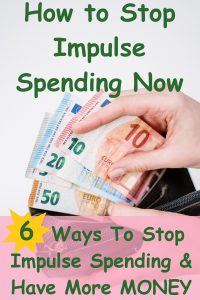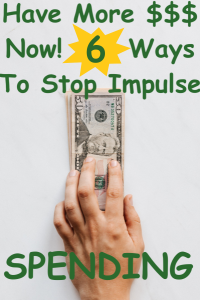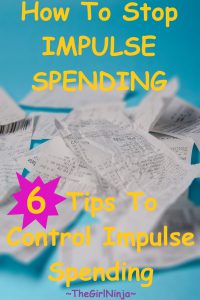Save Money NOW: How to Stop Impulse Spending

I don’t know anyone who hasn’t been taken down by the allure of impulse spending. Whether it’s junk food, healthy food, knick knacks, or some miscellaneous item, there is something about an amazing display or advertisement that triggers an emotion connecting an item to our instantaneous happiness. In that moment without thinking we make a purchase and are happy, for that moment.
Then, typically within hours we all wonder the same thing, why, why did we make that purchase? Not only do we not need that item, but sometimes the item hurts us, causing emotional pain. Like, when an impulse spend derails another goal. For example, when an impulse spend derails our diet or budget goals, and the end result is frustration and guilt. A moment of happiness for the lasting feeling of frustration and guilt, not what any of us bargained for in that moment of weakness when we made the impulse purchase.
So the question is, how to stop impulse spending or how to control impulse spending?
You will be happy to hear it is possible and there are ways to stop yourself from impulse spending. I know because I used to make impulse purchases all the time, I was terrible, I clung to that moment of happiness to only feel defeated in the end. Now, everyone is unique, so each individual’s plan to stop impulse spending may need to be personalized. Looking at the larger picture though, we all have to start in the same place.
Consider this the starting line to stop impulse spending now.

Admit that you have a problem, the problem is impulse spending, and you need help.
Once you admit that you have a problem, the next step is figuring out what you need to help yourself. This might be counseling or confiding in a close friend or significant other to support you. You will have to determine what type and the extent of support you need. Below is a description of what you can do to stop impulse spending or control impulse spending at the grocery store, restaurants, and at stores like Target. Full of impulse spending tips I share my own personal journey that I took to stop impulse spending. I hope that you will be able to utilize pieces of my journey to help you through your journey to stop impulse spending or control impulse spending.
First Things First, Budget
The first thing I did was start budgeting. You can find a detailed tutorial on how to budget here, if you are looking to get started. Through budgeting you can start to track your expenses and learn how much you spend a week on impulse spending. When I took a look at my spending, I found that about $30 a week was going towards impulse spending. Most of my impulse spending was on food (food on the go and grocery store grabs), and also some impulse spending from stands near cash registers at stores like Target, Michaels, and 5 Below.
After I recognized that I make impulse purchases I decided that I needed to change to improve my family’s financial situation. Through the journey to budget I allotted a specific amount of money I could spend on groceries, eating out, and spontaneous purchases every week. Since I only had a specific amount of money to spend every week I was forced to think carefully about every item I chose to pay for. Specifically I thought about if the purchase would put me over the dollar amount I had a goal to stay financially within.
At The Grocery Store
This meant that in the grocery store I had to add every item up as I placed it in my cart. Sometimes meeting my grocery budget meant stopping myself before the cash register, and deciding what to remove from the cart before checking out to reduce the purchase by $10-20. To be clear my family and I were still eating three meals a day, and were healthy even with the reduced grocery budget I worked within. Typically, the items removed from my cart before checking out were extras that we did not need, but only wanted.
At the beginning of this journey, some of you may feel embarrassed or ashamed. You should know that it is a common feeling, resulting around uncertainty, fear, and change. Also know that as you get used to a budget you will most likely feel proud of your budget, and think others are crazy for not having a budget. It’s all a process that will happen in due time, so hang in there and know you are not alone on this journey.
Restaurant Expenses

To stay within our budget for eating out, I had to regularly check my credit card activity (I always make fast food and restaurant purchases on my credit card). So, every time I want to order in or grab food on the go or go out to eat, I made it a habit to check my credit card activity and add up all expenses for eating out in the past week or month. If I was near my budget limit then eating out was not an option. This meant a multitude of things depending on the moment. Sometimes it meant eating before we left the house, other times it meant packing a meal to eat on the go, and sometimes it meant I had to ask my friends to come over for dinner as opposed to going out for dinner.
Not eating out as much is a difficult transition, but a transition that can save you $100s or $1000s a year. Most of the time it’s also healthier for you to eat homemade meals than restaurant prepared foods. So if it’s hard for you to admit that you have to stop eating out for monetary reasons, tell yourself and others that it is a New Year’s resolution to get healthier.
To break it down for you, a sausage, egg, and cheese breakfast sandwich from Dunkin Donuts costs $3.59. If you were to go to your local grocery store and buy the ingredients to make your own, each sandwich would cost you $1.40. That is saving you $2.19 every time you make your own breakfast sandwich. So if you replace buying a breakfast sandwich with making a breakfast sandwich at home twice a month or 24 times a year, you are saving $52.58 a year! That’s a lot, and if you are anything like me, you probably are eating out more than 2 breakfast sandwiches a month. Just think of how much you could save!
Control At Stores Like Target, Michael’s, 5 Below, etc.
To stop impulse spending at stores like Target, Michael’s, and 5 Below I have to plan my purchase(s) at those stores prior to going into them. So, if I want to go to Target I first have to take a moment and ask myself the following questions;
- What am I going to purchase while I am there?
- Are the purchases needs or wants?
- What dollar amount do I plan to spend on this one trip to Target?
- Does this purchase fit within your budget?
That last question is critical to stop impulse spending. If the purchase you want or need does not fit into your budget then you owe it to yourself to plan for this purchase. Sit down, and plan to set aside money in your budget so you can reward yourself with the purchase after taking the time to save for the purchase.
By not going into a store without a planned budget you are more likely to control impulse spending, and not throw money away with impulse spending. To motivate you along your journey think of what you are giving yourself by NOT impulse spending. Research shows that the majority of impulse spending is on food, so most likely you will be healthier if you stop impulse spending. A great addition to any diet plan, do NOT make impulse food purchases. You will also be paying yourself to stop impulse spending. Think of that vacation you’ve been saving for or that home improvement project you can’t wait to get completed. When we control impulse spending we give ourselves more money to spend on what we want.
Your health and an increase in your savings are two great reasons to stop impulse spending. There are not too many other changes in the world you can make that have such a big impact on your immediate value of life. So, if you have a problem with impulse spending use this time as an opportunity to improve your health and increase your savings.

If you are interested below is a link to some research on impulse spending that I found helpful.
Support To Stop Impulse Spending
Another helpful way to stop impulse spending is to call your support person before making impulse purchases. This is not always easy, but I have an example of a situation that I feel is the perfect example of a time I regret not calling in reinforcements. You see, I met up with a family member for some shopping in a quaint town halfway between where we live, and were browsing the cutest little mom and pop shop. In this shop I found a wooden tray that I really liked, but when I looked at the price tag it was well over what I had planned to spend in that store (about $50). I continued walking around the store debating on whether or not to purchase it. Specifically I could not decide because I was going through questions to justify the purchase, and could not think of a good place in my home to put it if I did purchase it. I decided I should call my husband thinking maybe he would have a good place to put it, if not then I shouldn’t purchase the tray, it would only cause a headache when I got it home and didn’t know where to put it.
As I went to call my husband the family member I was with came over to me and asked what I was doing. I explained that I was thinking about getting the tray and was going to call my husband to see what they thought. At the time the individual sharply voiced that I didn’t need to call my husband, and that if I wanted something I should buy it, and if I didn’t buy it they would buy it for me. At the time I was taken aback by this family member’s strong opinion that I should purchase this tray, but I also didn’t want them to purchase it for me, so I bought it.
On my way back to my car a local older gentleman offered me a ride in his golf cart with my tray. As we rode he mentioned that the tray looked new and rambled on about how it would have been made, casually throwing in the cost of the material as he went on. Needless to say according to this gentleman I more than overpaid. To add more salt to my wound, when I got home with my tray I couldn’t find a place to put the tray that I liked in my home, and it became an item that was in my way for two months while I figured out what to do with it.
After much thought about how that moment played out in the shop. I think maybe my family member misinterpreted my action to call my husband as me looking for permission. In reality I was looking for information to make an informed and purposeful purchase. What I wish I had done instead of purchasing the item abruptly is responded to my family member with the fact that I didn’t really know where I would put the tray, and did not want more clutter. So, I was calling my husband to see if they had an idea of where we could place the tray. If only we could go back in time, either way it’s a lesson learned.
Overall the journey to stop impulse spending is not glamorous. The journey can be challenging and at times feel tedious. It is important that as you strive to overcome impulse spending you keep your end goal in mind. Whatever your end goal is, that is the reason you go through the tedious actions and commitments to stop impulse spending. At the end, whether it’s enough money for the down payment on a home, less clutter in your home, or the loss of 5 pounds because you stopped buying foods you snack on, that is the glamorous part. Goals are not supposed to be easy, that’s why we all work towards them, and celebrate when we reach goals.
6 Tools to Stop Impulse Spending Now

- Budget
- Prioritize your health
- Prioritize your savings
- Call your support person
- Stop before you get to checkout and ask yourself what you don’t need
- When you impulsively pick up an unplanned item, to purchase, think through several questions, like listed above, before committing to the purchase

